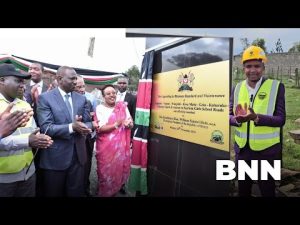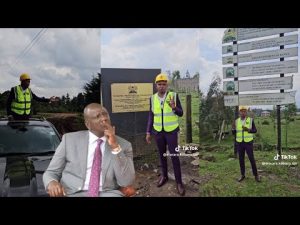State House claps back at Lawyer Morara Kebaso over claims on Ruto’s dead projects: ‘Stop misleading Kenyans,’ asserting that key initiatives such as road construction, new hospitals, economic reforms, infrastructure upgrades, and job creation are progressing well and not stalled as claimed

The recent allegations made by Lawyer Morara Kebaso regarding President William Ruto’s purported “dead projects” have sparked significant controversy.
As the debate intensifies, State House has firmly rebutted Kebaso’s claims, labeling them as misleading and unfounded.
This article delves into the details of the ongoing discourse, providing a comprehensive analysis of both sides of the argument and exploring the broader implications for Kenya’s political landscape ABOUT .Lawyer Morara Kebaso Over Claims on Ruto’s Dead Projects.
State House Claps Back at Lawyer Morara Kebaso Over Claims on Ruto’s Dead Projects: ‘Stop Misleading Kenyans
The Allegations: A Closer Look at Morara Kebaso’s Claims
Lawyer Morara Kebaso has gained attention for his outspoken criticism of the Ruto administration, particularly concerning what he describes as “dead projects.” According to Kebaso, these projects, which were initiated with much fanfare, have either stalled or failed to deliver the promised benefits.  He has pointed to infrastructure projects, healthcare initiatives, and economic reforms as key examples of the administration’s alleged failures.
He has pointed to infrastructure projects, healthcare initiatives, and economic reforms as key examples of the administration’s alleged failures.
Kebaso’s critique has resonated with a segment of the Kenyan population, particularly those frustrated with the pace of development and economic growth. His arguments are grounded in the belief that the Ruto administration has not only failed to deliver on its promises but has also misled the public about the progress of these projects.
Key Allegations by Lawyer Morara Kebaso
- Stalled Infrastructure Projects: Kebaso claims that several high-profile infrastructure projects have come to a standstill, with little to no progress being made since their inception.
- Unfulfilled Healthcare Promises: He argues that the administration’s healthcare initiatives, including the construction of new hospitals and the provision of affordable healthcare, have not materialized as promised.
- Economic Reforms Falling Short: Kebaso contends that the economic reforms touted by the administration have not yielded the expected results, leaving many Kenyans struggling with high costs of living and unemployment.
State House’s Rebuttal: Addressing the Allegations
In response to Morara Kebaso’s claims, State House has issued a strong rebuttal, dismissing the allegations as baseless and misleading. The administration has emphasized its commitment to delivering on its promises and outlined the progress made on various fronts, including infrastructure, healthcare, and economic reforms.
Infrastructure Development: A Pillar of the Ruto Administration
State House has highlighted the numerous infrastructure projects that are currently underway, arguing that these initiatives are far from being “dead.”
According to official statements, significant progress has been made in areas such as road construction, bridge building, and urban development. The administration has provided data and timelines to support its claims, showcasing ongoing work and future plans to complete these projects.
Healthcare Initiatives: Progress and Challenges
Regarding healthcare, State House has acknowledged the challenges faced in implementing some of the administration’s ambitious plans but has also pointed to tangible progress. New hospitals have been constructed, and efforts to improve access to healthcare services are ongoing. The administration has cited budget allocations, partnerships with international organizations, and community outreach programs as evidence of its commitment to improving healthcare in Kenya.
Economic Reforms: Balancing Growth and Stability
On the economic front, State House has defended its policies, arguing that the reforms introduced by the Ruto administration are designed to promote long-term growth and stability. While acknowledging the difficulties faced by many Kenyans, the administration has pointed to positive indicators such as increased foreign investment, job creation, and efforts to reduce inflation as signs of progress.
The Political Implications: What Does This Mean for Kenya?
The exchange between Lawyer Morara Kebaso and State House is not just a debate over facts and figures; it is also a reflection of the broader political dynamics in Kenya.
As the country prepares for future elections, the narrative around development, governance, and accountability will play a crucial role in shaping public opinion.
Public Perception: Trust and Credibility
Public trust in government institutions is a critical factor in any democracy, and the current debate has the potential to influence perceptions of the Ruto administration. If the public perceives that the administration is not delivering on its promises, it could erode confidence in the government. Conversely, if State House’s rebuttal is seen as credible and convincing, it could reinforce support for the administration.
Opposition Strategy: Capitalizing on Discontent
For the opposition, the allegations made by Kebaso present an opportunity to galvanize support by tapping into public discontent. By framing the administration’s projects as failures, opposition leaders can position themselves as champions of accountability and transparency. This strategy could resonate with voters who feel left behind by the current government’s policies.
The Role of Media: Shaping the Narrative
The media plays a pivotal role in shaping public discourse, and the coverage of this debate will influence how it is perceived by the public. Balanced reporting that presents both sides of the argument is essential for ensuring that the public is well-informed. However, sensationalist or biased coverage could skew perceptions and contribute to further polarization.
Lawyer Morara Kebaso Over Claims on Ruto’s Dead Projects FAQs
1. What are the main projects that Lawyer Morara Kebaso claims have failed?
Lawyer Morara Kebaso has pointed to several infrastructure projects, healthcare initiatives, and economic reforms that he believes have stalled or failed to deliver the expected benefits. These include road construction projects, new hospitals, and economic policies aimed at reducing the cost of living.
2. How has State House responded to these claims?
State House has issued a strong rebuttal, dismissing Kebaso’s allegations as baseless and misleading. The administration has provided data and timelines to demonstrate the progress made on various projects, emphasizing its commitment to delivering on its promises.
3. What is the significance of this debate for Kenya’s political landscape?
The debate between Kebaso and State House is significant because it reflects broader political dynamics in Kenya. It has the potential to influence public perception of the Ruto administration and could play a role in shaping the narrative leading up to future elections.
4. Are there any ongoing investigations into the claims made by Kebaso?
As of now, there are no official investigations into Kebaso’s claims. However, the public debate has generated significant attention, and it is possible that further scrutiny could arise in the future.
5. How do these allegations affect public trust in the Ruto administration?
Public trust in the Ruto administration could be affected if Kebaso’s allegations gain traction and are perceived as credible. Conversely, if State House’s rebuttal is seen as convincing, it could reinforce public confidence in the government.
6. What are the potential economic implications of these claims?
If the allegations lead to increased public discontent, it could affect investor confidence and economic stability. On the other hand, if the administration’s progress on economic reforms is recognized, it could bolster economic growth and stability.
7. How has the media covered this debate?
Media coverage of the debate has been extensive, with different outlets presenting varying perspectives. The way the media frames the issue will likely influence public perception and the broader political discourse.
8. What role does the opposition play in this debate?
The opposition has capitalized on Kebaso’s allegations to criticize the Ruto administration, framing it as a failure to deliver on its promises. This strategy could resonate with voters who are dissatisfied with the current government’s performance.
9. What are the key factors that will determine the outcome of this debate?
The outcome of this debate will depend on several factors, including public perception, media coverage, and the ability of both sides to present compelling evidence to support their claims.
10. How can the Ruto administration address these allegations moving forward?
The Ruto administration can address these allegations by continuing to provide transparent updates on the progress of its projects, engaging with the public to address concerns, and focusing on delivering tangible results that improve the lives of Kenyans.
Conclusion
The debate between Lawyer Morara Kebaso and State House over the status of President William Ruto’s projects is a critical moment in Kenya’s political discourse. As both sides present their arguments, the public will be watching closely to see how this issue unfolds.
For the Ruto administration, the challenge lies in proving that its projects are not only alive but also delivering meaningful benefits to the Kenyan people.
 As citizens, we must stay informed and critically engage with the information presented to us. It’s essential to hold our leaders accountable while also recognizing the complexities of governance and development. By doing so, we can contribute to a more informed and constructive national dialogue.
As citizens, we must stay informed and critically engage with the information presented to us. It’s essential to hold our leaders accountable while also recognizing the complexities of governance and development. By doing so, we can contribute to a more informed and constructive national dialogue.
Call to Action: If you believe in the importance of transparency and accountability in government, take a moment to share this article and join the conversation. Your voice matters in shaping the future of Kenya. Let’s work together to ensure that our leaders deliver on their promises and build a better Kenya for all
Recent Posts
Finding reliable suppliers is essential for aviation operators searching where to buy Jet Fuel A1 in Romania because fuel quality directly affects aircraft safety and engine performance. Romania has...
Romania’s strategic location in Eastern Europe, access to the Black Sea, and developed refinery infrastructure have made it a key jet fuel export hub in the region. In 2025, Romania exported over...